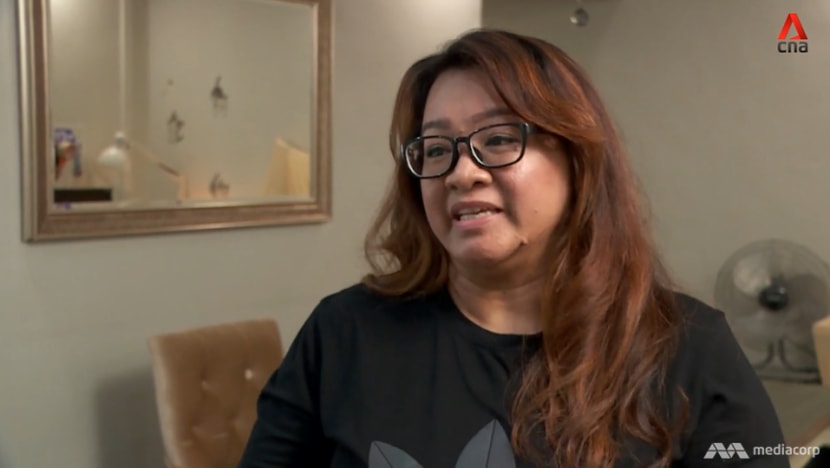When mobile phone usage comes between employers and domestic workers
From sexy selfies to oversharing information online, the way some helpers use their phones is making some employers uneasy. Talking Point finds out from both sides whether there is a way forward.

Have smartphone, will share — as seen on video-sharing network TikTok, which is popular among domestic workers right now.
SINGAPORE: Noraini Wahid was going to renew her foreign domestic worker’s contract when she discovered something distressing: The latter had a secret mobile phone, with pornographic photos and videos inside.
Unknown to her, the maid — who had a boyfriend — had also been taking selfies on the bed in her mother’s room “wearing just a bra”, and sharing those photos with him.
Noraini, a mother of three, had earlier put restrictions on the domestic worker having her own phone. But the latter bought one from another maid living in the same block, and hid it from her employer.
“The handphone is the root of all evil,” said Noraini. “I understand that they’re away from home, they miss their families … but you need to show me (that) I can trust you with your phone.”
So, while mobile phones keep many of us connected today, they are driving a wedge between helpers and employers like her. And the programme Talking Point finds out how employers can manage their maids’ smartphone usage to prevent misuse. (Watch the episode here.)

PRIVACY, SECURITY CONCERNS
International Labour Organisation (ILO) statistics last year show that fewer than half (47 per cent) of 297 employers surveyed in Singapore let their domestic workers access their phone outside working hours.
The confiscation of migrant workers’ mobile phones, or restriction on usage, is a “tactic in which employers exert power” over the workers, the ILO said in the report, Mobile Women And Mobile Phones.
The way some maids use their smartphones and overshare information, however, can be worrying.
In video-sharing network TikTok, for example — which is popular among domestic workers right now — it took Talking Point host Diana Ser only five minutes to find 50 accounts created by them.
One showed a maid in a bath towel dancing at her employer’s home. Another video was of a domestic worker singing and dancing with her employer’s daughter. And another one showed the street and block of the employer’s private estate.
“I’m wondering if permission was given by the parents for this video (with the child) to be taken and uploaded,” said Ser.
“Quite a few videos were taken within the premises of the employers. Again I wonder if that’s with the employers’ permission.”
For John Gee, a former president of non-profit organisation Transient Workers Count Too, it would not bother him if his helper were to share videos of herself “dancing around the kitchen, having fun”.
But he draws the line at pictures or videos of his children or even their bedrooms.
“We wouldn’t bring strangers into the bedroom — why would you want your bedroom to be shown online, on social media?” he said. “That’s something that you should definitely (make) very clear shouldn’t happen.”

While some of these videos did not reveal precise locations, technology writer Paul Mah, who covers cybersecurity trends, thinks there is cause for concern.
The images and videos were probably uploaded without the employers’ permission or knowledge, he said. And “over a period of time, (they) reveal a lot of information”, such as the household they are employed in and the people living there.
In fact, from one of the TikTok accounts, Ser was able to track down the domestic worker’s address, down to the Housing and Development Board unit in Tampines and the employer she was caring for.
“Even when the helper moves on to the next household, these videos (and) images presumably will … stay on social media,” said Mah. “And anybody is able to log in and view (them).”
These videos could also attract scammers, who may potentially use them to “find out more information about a household before trying to call (on) the vulnerable and elderly”.
COMMUNICATION IS KEY
While first-time foreign domestic workers in Singapore must attend a one-day Settling-In Programme to be familiarised with local laws and equipped with on-the-job safety training, there is no module covering the dos and don’ts of using mobile phones at work.
The Manpower Ministry also does not have explicit rules on how employers should manage their helper’s smartphones.
Instead, it is left to the policy of employment agencies and for employers to lay down the house rules, such as when she can use her phone.
Calvin Chew, for example, lets his maid use her phone when she has finished her duties. But to restrict her from overusing it, he does not provide her with Wi-Fi access at home.
“She’d be using (her) own data plan. So the more she uses, the more she pays,” he said. “In that sense, she’ll know how to control (her usage).”
Domestic worker Robina Navato knows many others whose phones were confiscated before they started their jobs, which is why they resort to buying a second, secret phone.
Her previous employer was strict about her phone usage, allowing her to use it only after 11pm. But by then, her family members would be asleep. She began to feel homesick, and called it quits after two months.
She decided to share her story because “it’s very important for employers to know that we domestic workers are human beings too”. “Sometimes they forget that we’re away from our families,” she said.
Especially for the new ones, it’s very important … to communicate with our families back home or to our friends. At least they’d know our situation here.
Over the past 20 years, Gee and his wife Cecilia Siow have employed six helpers in their household, and they have never had to place any restrictions on mobile phone use.
“I’ve never had my boss … talk to me about handphone usage,” pointed out Siow. “I’d be appalled if I have to do that with Lyn (the current helper). She’s not a child.”
But what happens if there are helpers who, despite having guidelines, continue to use the phone when they are not supposed to do so?
Said Gee: “If we (employers) have concerns, then we should share them. We talk about it, and we come to an understanding.”
Watch this episode of Talking Point here. New episodes on Channel 5 every Thursday at 9.30pm.
















